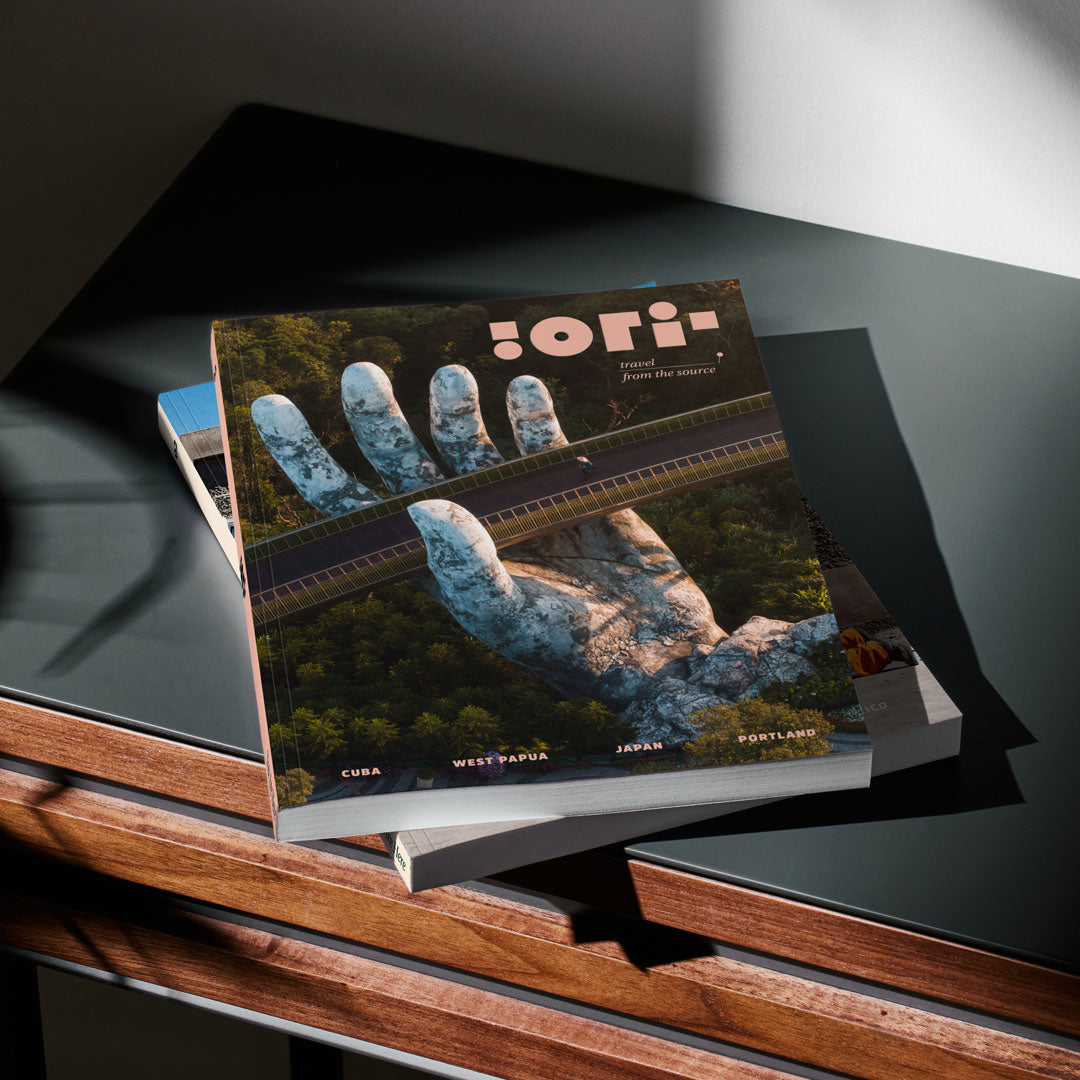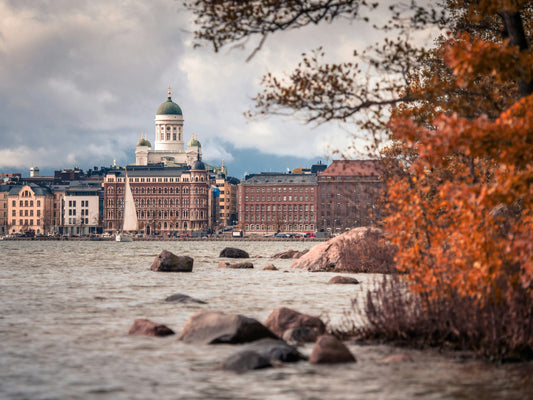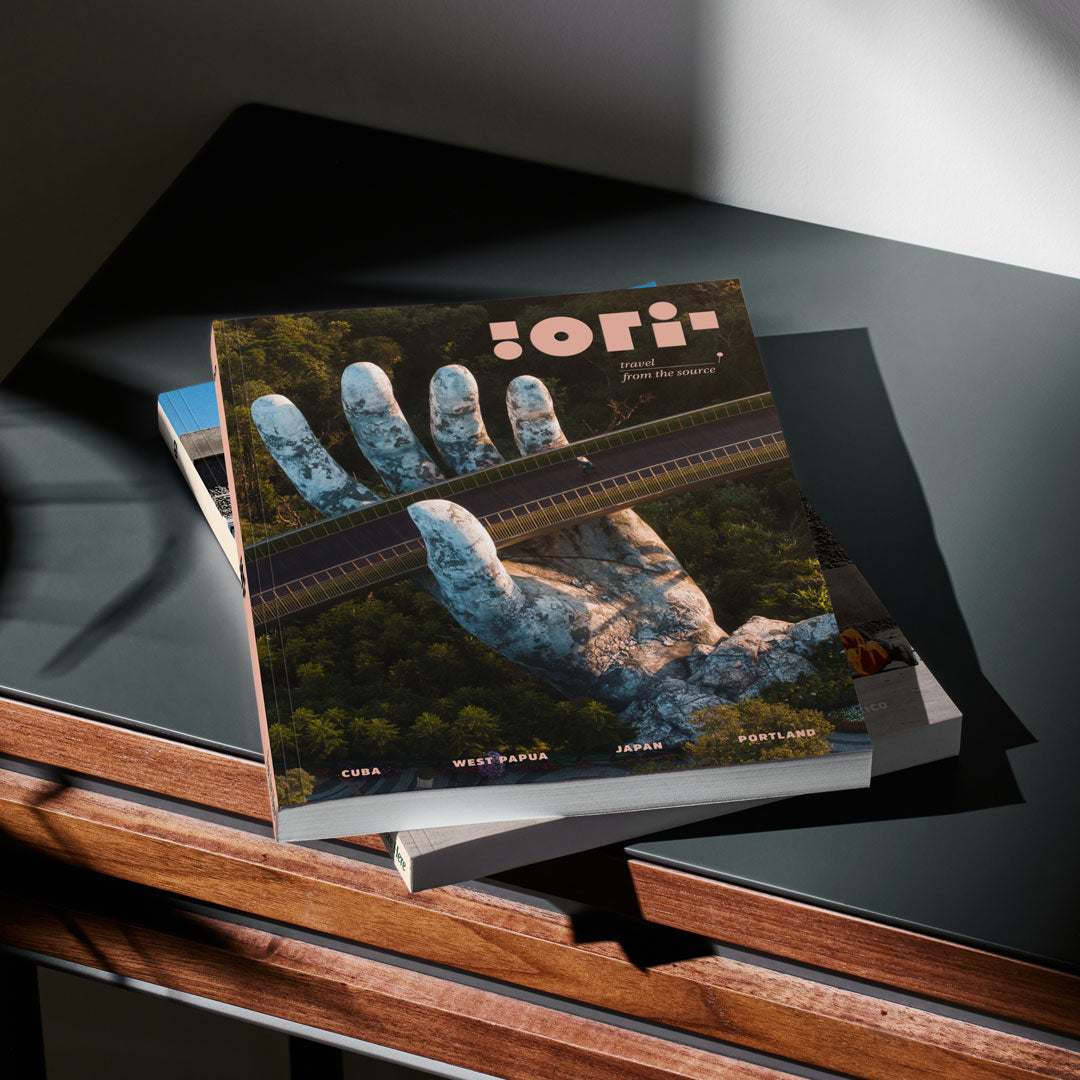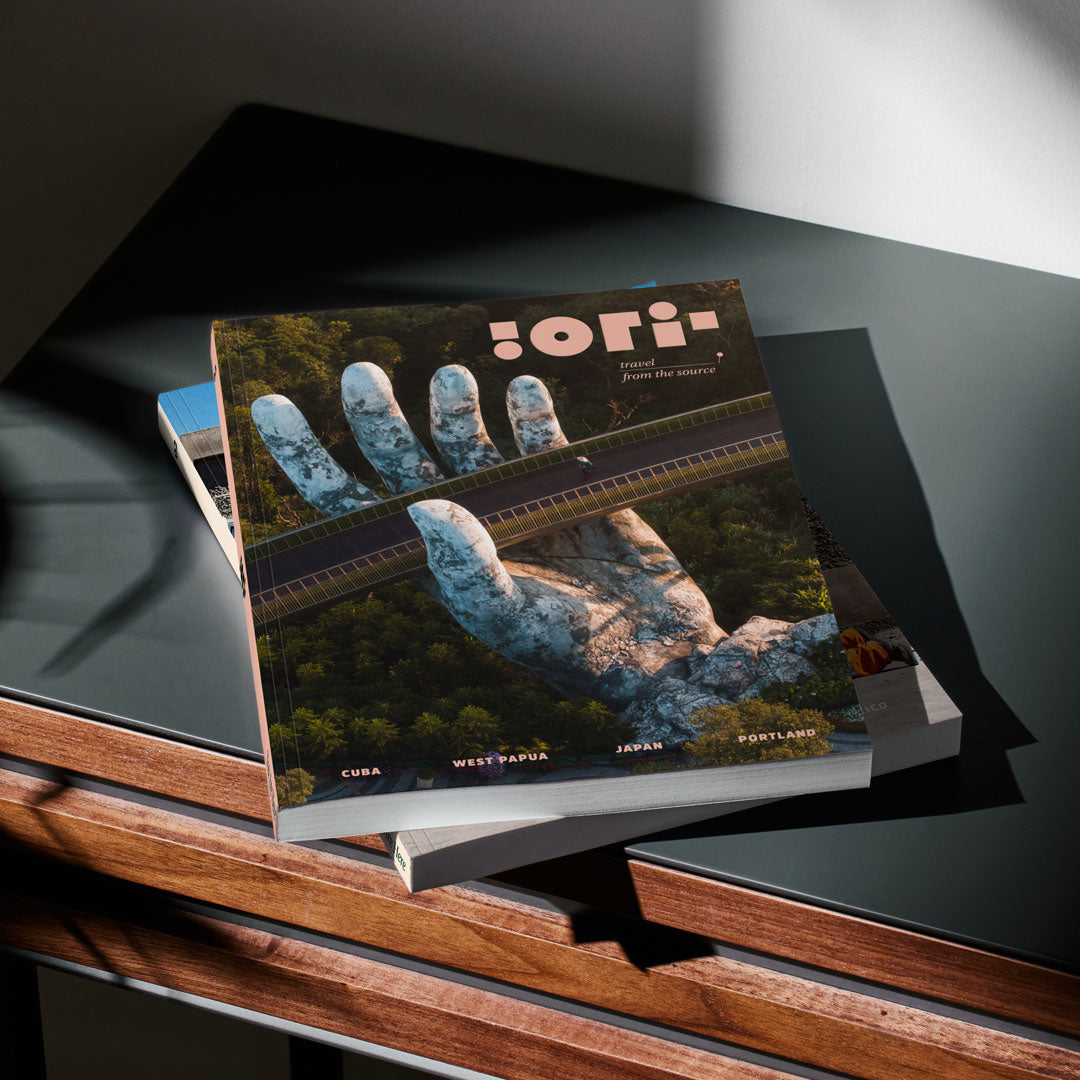Palabras: Josie Collier
“ Entra, siéntate, entra, siéntate ”, las palabras flotaron desde una mujer que no me llegaba al hombro. Su cabello gris ombré caía en dos trenzas sobre sus hombros, sus gafas de montura morada combinaban con el tono de su suéter de lana, y sus piernas se movían velozmente del comedor a la encimera: una hermosa pieza de madera seccionada transversalmente que se extendía a lo largo de la cocina. Se llamaba Gladys Cavero Huernante, era nuestra chef y anfitriona de la tarde.
Siguiendo órdenes, entré en su casa. Un ventanal del suelo al techo proyectaba una luz sombría sobre un carrito de bar de los años 70, polvoriento y de pie. A pocos metros por encima del carrito había otra antigüedad: una pintura de la cabeza flotante de Felipe Camiroaga , un adorado presentador de televisión chileno fallecido en un accidente aéreo.
 “Muchas mujeres perdieron a sus seres queridos ese día”, recordó Josefin, guía del Hotel AWA Puerto Varas. El Hotel AWA había organizado la excursión para que sus huéspedes aprendieran sobre el patrimonio cultural local con Gladys. Ahora todos estábamos sentados en silencio, cada uno cortando un corte de carne desconocido, cubierto con guisantes y zanahoria picada. Poco sabíamos, pero mientras comíamos, un recordatorio aún más crudo de la muerte y el tiempo se encontraba a pocos metros de la cocina.
“Muchas mujeres perdieron a sus seres queridos ese día”, recordó Josefin, guía del Hotel AWA Puerto Varas. El Hotel AWA había organizado la excursión para que sus huéspedes aprendieran sobre el patrimonio cultural local con Gladys. Ahora todos estábamos sentados en silencio, cada uno cortando un corte de carne desconocido, cubierto con guisantes y zanahoria picada. Poco sabíamos, pero mientras comíamos, un recordatorio aún más crudo de la muerte y el tiempo se encontraba a pocos metros de la cocina.
Gladys había preparado nuestra comida en el ataúd de su esposo. La improvisada encimera de madera estaba preparada para la preparación mientras una estufa y un horno de tamaño industrial cocinaban la carne. Preparar un almuerzo desde un ataúd fue un acontecimiento inesperado para una tarde en la que teníamos pensado dedicarnos a hilar y tejer lana.
Josefin nos recordó que en un lugar como la casa de Gladys, junto a la famosa Carretera Austral (la carretera que conecta toda la Patagonia), las funerarias no son precisamente comunes. Su casa se encuentra en la confluencia rural de volcanes, parques nacionales, cordilleras, ríos y lagos interminables de la región de los Lagos de la Patagonia Norte en Chile, muy lejos de las comodidades modernas y, sí, incluso de las morbilidades como los lugares de descanso final.
Gladys dijo que vio un árbol hermoso y pensó que sería ideal para el ataúd de su esposo. Pero la madera era demasiado bonita para enterrarla. Era necesario verla.
Su tono de voz se impregnaba de preparación y orgullo, y se extendía a la habitación tras el mostrador. Un pasillo de mantas de lana, hilo y herramientas de madera para tejer cubría las paredes. Gladys hilaba la llana en ovillos azules, blancos y grises. Josefin le tradujo del inglés al español: "¿Cuánto tiempo se tarda en hilar un ovillo de lana?".
Un encogimiento de hombros con seguridad: una hora . Una hora fue un breve lapso en la tradición chilena de más de 150 años. Procedió a hilar y a pasar los dedos de un lado a otro del telar, creando intrincadas mantas y otras piezas de lana. Gladys aprendió esta práctica cultural del tejido de su madre. Ahora, Gladys tiene 20 nietos de sus siete hijos (aunque solo uno continúa participando en el negocio).
 Gladys forma parte de la Fundación de Artesanías de Chile, una organización privada sin fines de lucro que busca preservar las tradiciones artesanales auténticas e históricas. La fundación trabaja con artesanos de cestería, cerámica y telar, de los cuales más del 70% reside en zonas rurales como Gladys. La organización cuenta con la certificación de Comercio Justo de la Organización Mundial del Comercio Justo.
Gladys forma parte de la Fundación de Artesanías de Chile, una organización privada sin fines de lucro que busca preservar las tradiciones artesanales auténticas e históricas. La fundación trabaja con artesanos de cestería, cerámica y telar, de los cuales más del 70% reside en zonas rurales como Gladys. La organización cuenta con la certificación de Comercio Justo de la Organización Mundial del Comercio Justo.
A veinte pasos de la casa de Gladys hay otra estructura de una sola planta. Esta está llena de bolsas de lana y una mesa de clasificación para la lana sucia y limpia. Aquí, con la ayuda de la fundación, Gladys gestiona el "Banco de Llana". Este banco de lana es un centro artesanal para pesar, vender y comprar lana, y a veces Gladys enseña a los niños a tejer con telar.
La Fundación de Artesanías de Chile se ha asociado con el Hotel AWA Puerto Varas en la Región de los Lagos, en la Patagonia Norte de Chile. Ubicado a orillas del lago Llanquihue, el brutalista edificio de cristal del hotel se complementa con la belleza natural de las vistas al Volcán Osorno desde prácticamente todas las habitaciones. Su privilegiada ubicación lo convierte en un acogedor punto de partida tras un largo día explorando la región a pie, en kayak o en bicicleta gracias a las excursiones guiadas del hotel.
El Hotel AWA Puerto Varas también colabora con artesanos locales como Gladys, ofreciendo excursiones culturales para que sus huéspedes conozcan las tradiciones del telar y la cestería, entre otras. Esta singular excursión se inspiró en un reciente premio otorgado a la región. En 2023, el Distrito de los Lagos albergó dos Ciudades Artesanales Mundiales, que reconocieron a los artesanos de la región como expertos en sus respectivas artesanías.
El hotel cuenta con la certificación B Corp , reconocida por su impacto económico y ambiental sostenible. La unión de estas dos organizaciones ha abierto nuevas puertas y ha dado reconocimiento a oficios tradicionales y artesanos capacitados.
Aún así, incluso con el reconocimiento tanto de la Fundación como del Hotel AWA, Gladys dice que uno de los mayores problemas que enfrenta es la pérdida de popularidad de la tradición entre las generaciones más jóvenes.
“El gobierno quiere que esta tradición siga viva. Le están dedicando tiempo, dinero y esfuerzo”, añade Alan, otro guía del Hotel AWA, durante nuestra tarde con Gladys.

Mientras que la población y el crecimiento económico de la Región de los Lagos aumenta en ciudades como Puerto Varas debido al turismo, las poblaciones rurales de la zona en realidad están disminuyendo .
“Los jóvenes no están muy entusiasmados con [continuar con estas tradiciones]”, dice Alan. “Quieren irse a las grandes ciudades y conseguir trabajo”.
Alan también comenta que los artesanos pueden pasar largas jornadas en el mercado y vender solo un producto. Con ese tipo de ingresos, los jóvenes optan por probar suerte en los centros urbanos o unirse a la industria salmonera local, una industria que, en Chile, emplea a más de 70.000 personas y supera los 4.000 millones de dólares en exportaciones anuales.
Actualmente, la Fundación de Artesanías de Chile trabaja con cerca de 2.300 artesanos para nivelar el mercado . La organización ahora cuenta con una tienda física en la ciudad de Puerto Varas, en la Región de Los Lagos, donde los artesanos pueden vender sus artesanías. No es una vida fácil, ya que las ventas de estos productos artesanales no están garantizadas debido a la fluctuante demanda de los consumidores, pero proporciona una sólida plataforma para que Gladys y sus colegas artesanos puedan desarrollarse.
La mayoría de los hijos de Gladys se han mudado a las ciudades de Chile por trabajo. Ahora, ella y su esposo (muy vivo) viven en casa. Se acerca su 90.º cumpleaños, al igual que su 60.º aniversario de bodas. Esta región lacustre ha sido su hogar durante toda su historia de amor. El tejido también ha sido una constante durante todas estas décadas, una forma de arte local que ahora se desvanece en el hilo de Gladys.
«No podemos perder este patrimonio», dice. «Lucho por él».
















